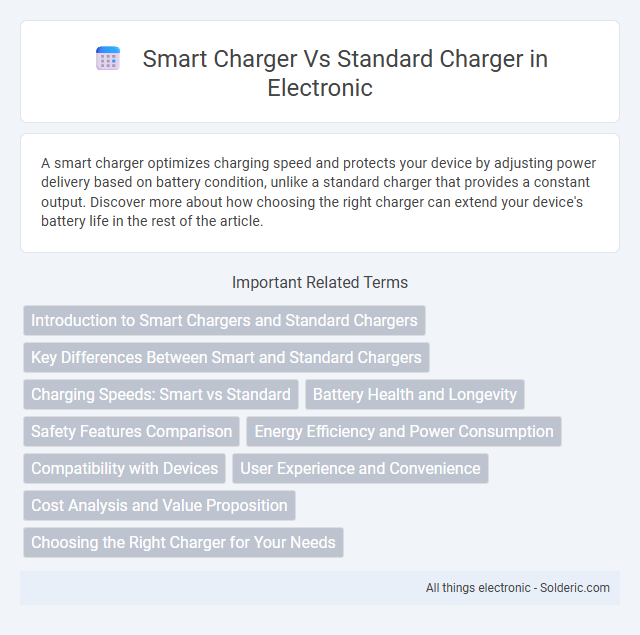A smart charger optimizes charging speed and protects your device by adjusting power delivery based on battery condition, unlike a standard charger that provides a constant output. Discover more about how choosing the right charger can extend your device's battery life in the rest of the article.
Comparison Table
| Feature | Smart Charger | Standard Charger |
|---|---|---|
| Charging Speed | Optimized for fast and safe charging | Fixed, slower charging rate |
| Battery Health | Monitors and protects battery lifespan | No battery protection features |
| Safety | Built-in safety features (overcharge, overheating) | Basic safety, less monitoring |
| Compatibility | Adjusts charging based on device type | Universal but less adaptive |
| Energy Efficiency | Reduces energy waste with smart control | Higher energy consumption |
| Cost | Higher initial cost | Lower upfront cost |
Introduction to Smart Chargers and Standard Chargers
Smart chargers use advanced technology to optimize battery charging by monitoring voltage and temperature, providing faster, safer, and more efficient charging compared to standard chargers. Standard chargers deliver a fixed amount of power without adjusting to the battery's condition, which can lead to slower charging and potential battery damage over time. Choosing a smart charger can enhance your device's battery lifespan and charging performance.
Key Differences Between Smart and Standard Chargers
Smart chargers feature advanced microprocessor technology that regulates charging current and voltage to optimize battery health and efficiency, while standard chargers deliver a constant current without adjustment. Smart chargers often include safety mechanisms like overcharge protection, temperature monitoring, and automatic shutoff, unlike standard chargers that may risk battery damage if left connected too long. The intelligent charging process of smart chargers extends battery lifespan and reduces energy waste compared to the fixed output of standard chargers.
Charging Speeds: Smart vs Standard
Smart chargers optimize charging speeds by dynamically adjusting power output based on battery status, enabling faster and safer charging compared to standard chargers. Standard chargers deliver a fixed power level that may result in slower charging and potential battery strain. Intelligent power management in smart chargers reduces charge time while preserving battery health, offering a more efficient charging experience.
Battery Health and Longevity
Smart chargers regulate voltage and current to prevent overcharging, significantly enhancing battery health and extending your device's lifespan compared to standard chargers that supply a constant current regardless of battery status. These intelligent systems monitor temperature and battery conditions, optimizing charge cycles to reduce wear and prevent overheating. Using a smart charger ensures balanced energy input, which preserves battery capacity and boosts overall longevity effectively.
Safety Features Comparison
Smart chargers incorporate advanced safety features such as overcharge protection, temperature regulation, and short-circuit prevention, significantly reducing the risk of battery damage and fire hazards. Standard chargers typically lack these safeguards, making them more prone to overheating and potential battery degradation. Choosing a smart charger ensures enhanced safety for your devices by continuously monitoring and adjusting the charging process.
Energy Efficiency and Power Consumption
Smart chargers optimize energy efficiency by automatically adjusting power delivery based on your device's battery status, minimizing unnecessary energy consumption and heat generation. Standard chargers supply a constant output regardless of battery needs, often leading to higher power consumption and wasted energy. Choosing a smart charger significantly improves energy management, reducing your electricity costs and environmental impact.
Compatibility with Devices
Smart chargers offer enhanced compatibility with a wide range of devices by automatically adjusting the charging current and voltage to suit each device's specific requirements. Standard chargers typically provide a fixed output, which may not be optimized for all gadgets, potentially leading to slower charging or even device damage over time. Your devices benefit from the adaptive technology in smart chargers, ensuring safer and faster charging across various smartphones, tablets, and other electronics.
User Experience and Convenience
Smart chargers enhance user experience by automatically adjusting charging speed based on device capacity, preventing overheating and extending battery life. They offer features such as wireless charging, multi-device compatibility, and real-time charging status through smartphone apps, increasing convenience. Standard chargers lack these adaptive technologies, often resulting in slower charge times and limited usability across different devices.
Cost Analysis and Value Proposition
Smart chargers typically have a higher upfront cost compared to standard chargers but offer significant long-term savings through energy efficiency, faster charging times, and extended battery lifespan. The value proposition of smart chargers lies in their ability to optimize power delivery and monitor battery health, reducing electricity waste and maintenance costs. Standard chargers may be cheaper initially but often lead to higher operational expenses and shorter device longevity.
Choosing the Right Charger for Your Needs
Smart chargers offer advanced features like automatic voltage regulation, battery health monitoring, and optimized charging cycles, enhancing battery longevity and efficiency compared to standard chargers. Standard chargers provide basic, consistent power delivery but lack adaptive technology to prevent overcharging or overheating. Selecting the right charger depends on device compatibility, desired charging speed, and the importance of maintaining long-term battery performance.
Smart charger vs standard charger Infographic

 solderic.com
solderic.com